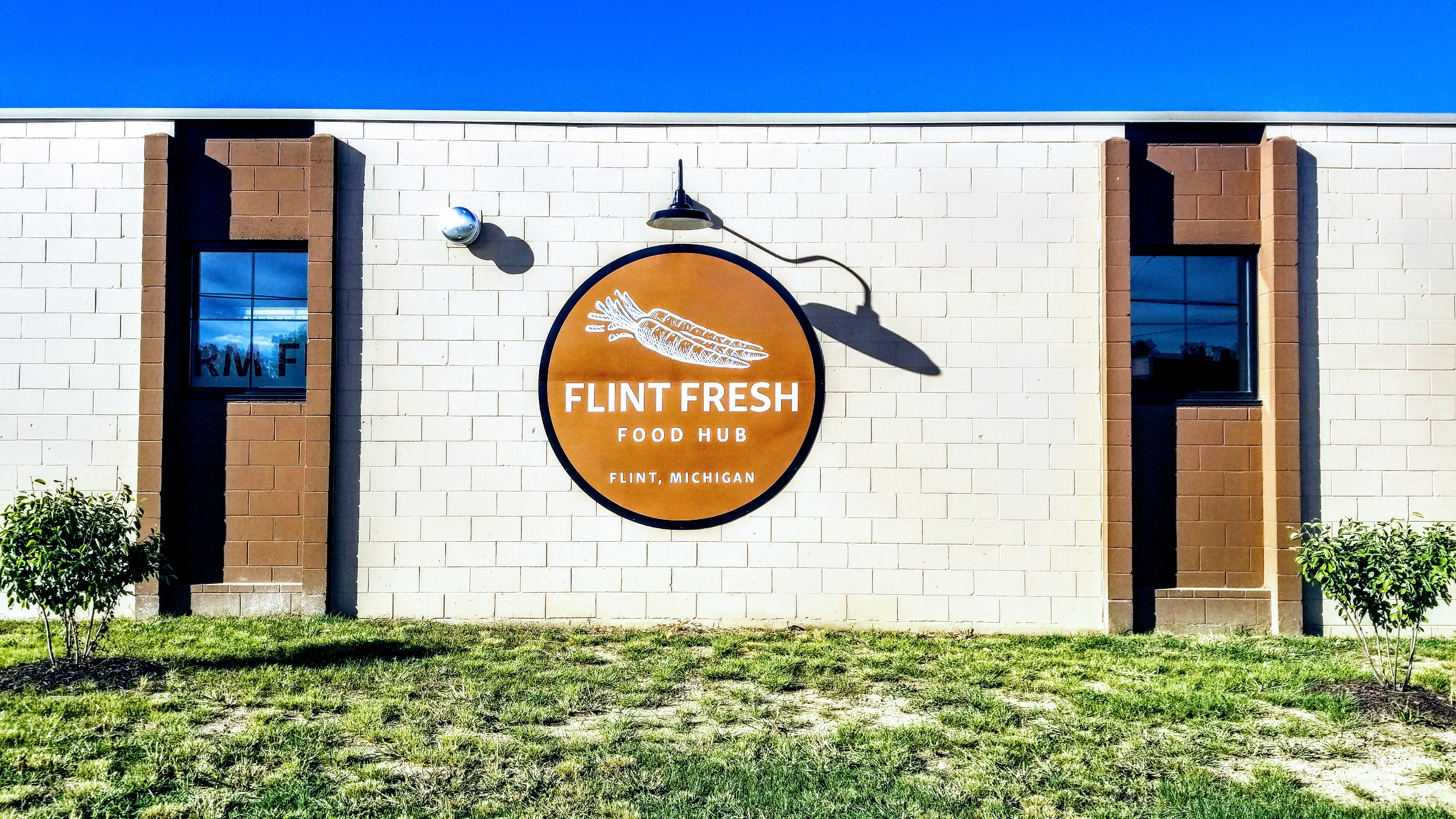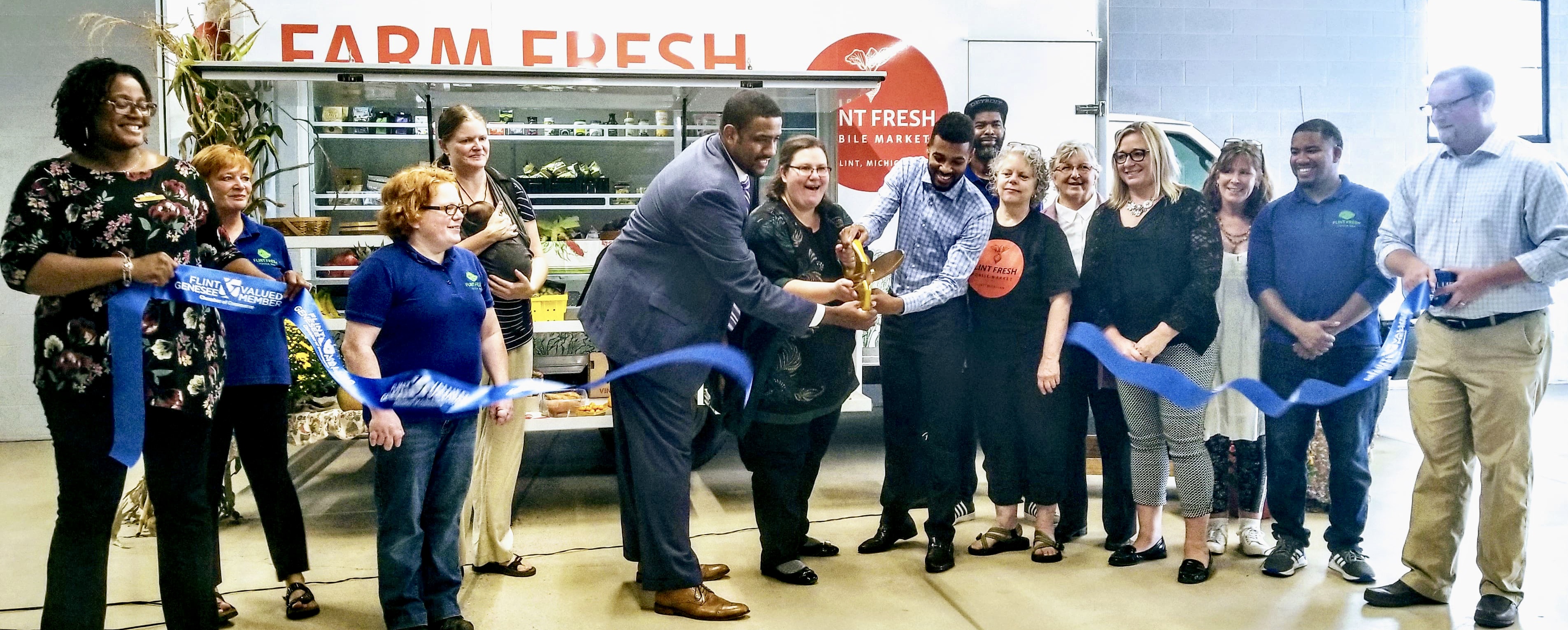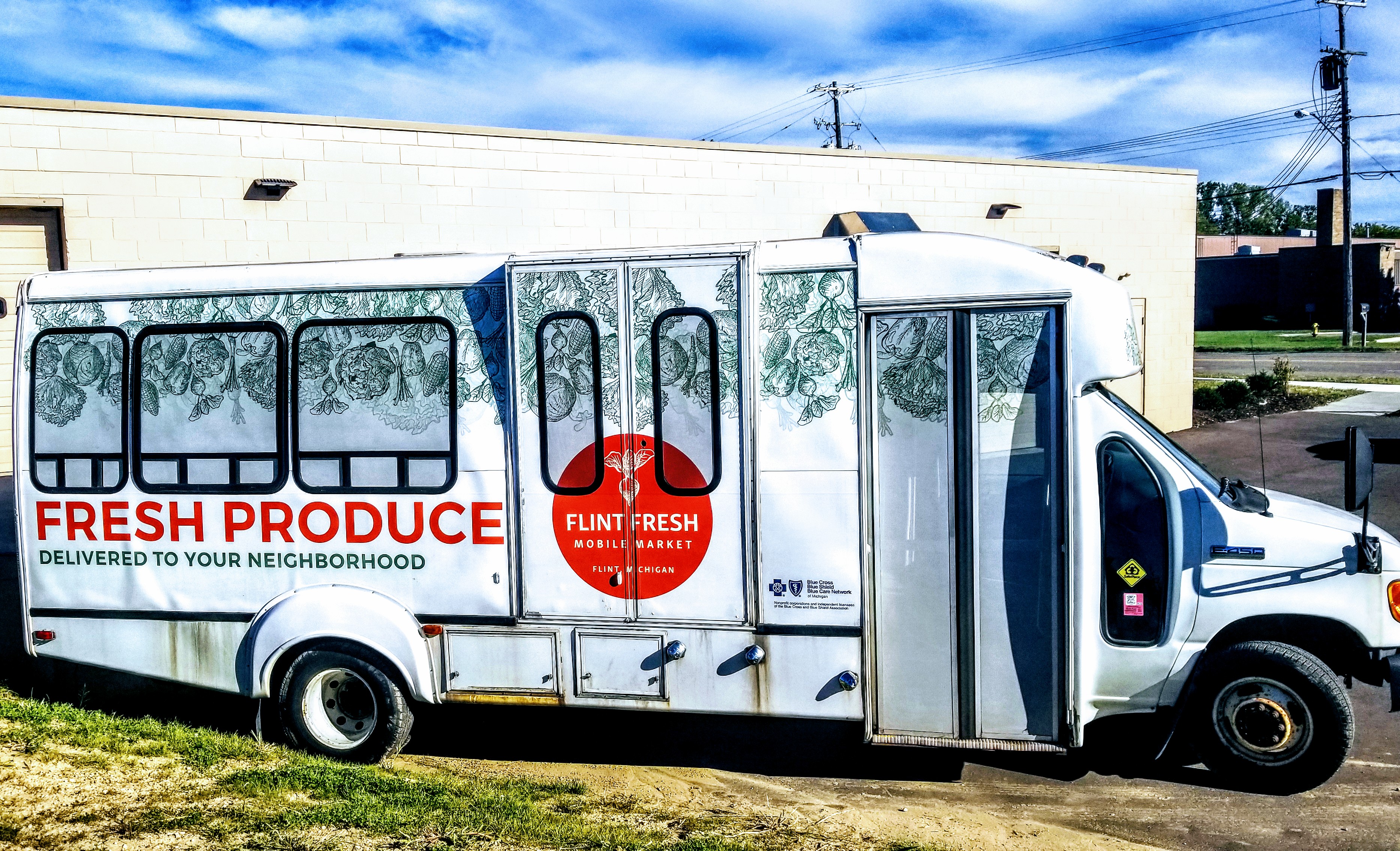By Darlene Carey
It seemed fitting just a day before the fall equinox that local growers gathered to celebrate a time of harvest and Flint food distribution advocates rejoiced in the official opening Sept. 21 of the new 14,530-square-foot Flint Fresh Food Hub at 3325 E. Court Street.

Locally grown produce will be aggregated and distributed from the Flint Fresh new facilities on East Court Street (Photo by Darlene Carey).
There is reason for the public to celebrate as well. The opening of the $1 million nonprofit food distribution center means expanded food options for residents and businesses within Flint city limits to buy locally-grown vegetables for pickup or delivery.
According to the FlintFresh website, delivery is available to Flint addresses on Tuesdays and Wednesdays. Routes have been organized by zip code, as follows:
Tuesdays: 48503, 48505 and 48506
Wednesdays: 48502, 48504, 48507 and 48532 (within Flint city limits).
Residents will be notified and given a time window of when a crew member will be in their area. The driver will leave their box on the doorstep unless otherwise arranged.
Or, anyone can choose to pick up their box at The Local Grocer (601 MLK Ave, 48502) during business hours by selecting the “pick up at store” option when placing their order.
Customers can choose small ($15) or large ($30) boxes. Orders are due by 5 p.m. the Thursday of the week before. There are two options: Farmer’s Choice, where customers leave it up to staff at the Hub to choose from the assortment available; or A La Carte where folks can use a drop-down menu online and choose five fruits and six vegetables. Orders may be placed online through the website or by phone at 810-620-1902.

Celebrants and partners at the Flint Fresh Food Hub (from left): Artina Sadler, Aaron Moss, Molly Emmerson, Erin Caudell, Kyle Guerrant, Pam Bailey, Isaiah Oliver, Bobby Blake, Holly Lubowicki, Jane Richardson, Cheryl McHallum, Lisa Pasbjerg, Trevor Norman and Sean Gartland (Photo by Darlene Carey)
Veggies to help mitigate lead exposure
The Court Street facility provides a new home for the Flint Fresh Mobile Market, founded in 2016 in response to the Flint water crisis, to provide fresh produce to underserved Flint residents with little or no access to grocery stores.
The organization helps bring the market directly to neighborhoods, offering residents the chance to purchase fresh greens, fruits and other healthy foods to mitigate lead exposure. The nonprofit market accepts most forms of food assistance benefits, including Double Up Food Bucks and the Michigan Bridge card.
The project was funded by local foundations and the Michigan Department of Education. The rehabbed building was formerly the Mill End warehouse and had been most recently owned by the Genesee County Land Bank.
Kim Bailey, board president for Flint Fresh Food Hub, said she was thankful for the numerous donors for support, “too many to name,” but acknowledged the Michigan Health Endowment Fund, Blue Cross Blue Shield of Michigan, Tides Foundation, Community Foundation of Greater Flint, and the Flint Child Health and Development Fund.
Bailey explained a food hub “aggregates food from farmers throughout the region and makes it possible for locally grown goods to reach broader markets.”
From one bus to three full-sized trucks

Deliveries spread outward to many Flint neighborhoods in a fleet of these Flint Fresh vehicles (Photo by Darlene Carey).
The initiative, started with a single re-commissioned MTA bus that went out into the Flint neighborhoods, has expanded to include three full-sized trucks and the vibrant veggie box delivery program.
In describing the advantages of the food hub, officials noted with big box grocery stores, money is piped out of the community. Only a small percentage of the food is locally sourced–most from out of state and even out of country, so customers often don’t know how long the produce sits and how fresh it is.
With the Hub, the flow of money stays in the local community, keeps the programs running and supports local farmers, officials noted, helping create a sustainable local economy. The produce comes in from the local farms, they’re inspected and sorted for quality, packaged and sent immediately so the food is much fresher.
How farmers qualify to participate
Holly Lubowicki, introduced as the “farm to fork” coordinator, explained how local growers can become eligible to be a part of the Hub.
Each spring, farmers meet and discuss the food safety requirements. Participating farmers have to have their soil tested every three years. Also, the farms must have water tested for e-coli and lead (if in Flint, every year). A food safety checklist needs to be filled out and the farmer must carry product liability insurance.
Lubowicki said 60 growers inquired about the program within the last two years, with 21 eligible growers currently providing produce. They come from Genesee County, Flint, St. Clair County, Oakland County and Tuscola County. A full list of participating farms is available here.
Each week, growers provide a produce list which Lubowicki and coworkers inspect and then “divvy up” what is needed for the veggie box and mobile market programs and what is needed for the wholesale workers.
“Nurturing the whole child”
Other guest speakers at the opening included Kyle Guerrant, deputy superintendent for finance and operations of the Michigan Department of Education. People may wonder why the Department of Education is so involved with this sort of project; to that, Guerrant replied, “it’s about educating the whole child, and part of that is nurturing the whole child.”
He said the goal is to have Michigan as the top state in education in 10 years, adding that would take working with organizations like Flint Fresh Food Hub who work in close connection with the community.
Empowerment “to do better for ourselves”
Also speaking was Isaiah Oliver, president and CEO of the Community Foundation of Greater Flint. Oliver said the CFGF partnership with the Hub started about four years ago concurrent with the water crisis “as a commitment to put a stake in the ground around the access to healthy food.”
Oliver described the Hub as a “leverage point” in that it creates a space that takes produce from multiple farms, pools those resources and packages them to provide that access.
“This empowers Genesee County and the folks in the region to do better for ourselves,” Oliver said.
Seven employees, many partners
The Hub’s year-round operation is home to seven employees, all of whom have been cross trained to do all required jobs.
Purchasing partners currently include many Flint businesses such as Hurley Food Pharmacy, General Motors, the Genesee Intermediate School District the CRIM Fitness Foundation and Michigan State University Extension.
Lubowicki said MSU Extension had been selling to food pantries and party stores. She also mentioned health cafes, local grocers and area restaurants are part of the wholesale side.
Assistant Market Manager Bobbie Blake offered a personal note, describing how he started out at a small farm on Beecher Road and was approached to work for Flint Fresh. “It literally started with three people…now there are seven of us.” He said the Hub will work closely with the community for ideas for expansion.
“We’re in the groundwork, right now,” Blake said. “Not very many people know about us yet.” Blake said events such as the Tour de Crim, Wellness Fairs and talking to parents at Flint schools help get word out to the community.
As the Hub gathers momentum for expansion, Karen Moss, mobile market representative, said she would like to see “more ward drops where we see one [hub] in every ward… go up and down the neighborhoods and spread the word.”
EVM staff writer Darlene Carey can be reached at darcar7@hotmail.com.


You must be logged in to post a comment.